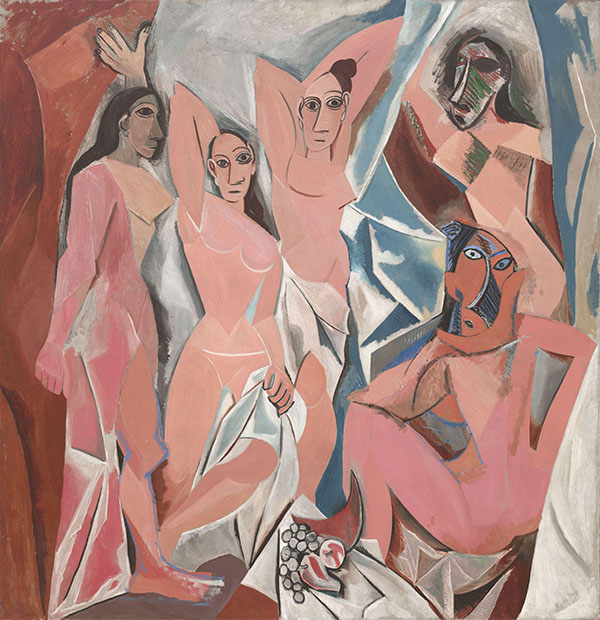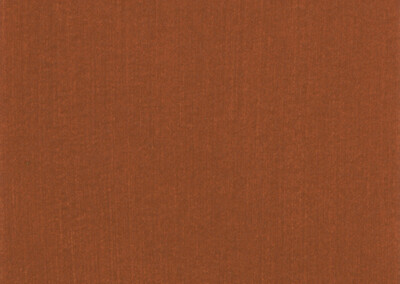Pablo Picasso, Les Demoiselles d'Avignon
1907Pablo Picasso, Les Demoiselles d'Avignon
1907Paintings sorted by Historical period | Painter | Subject matter | Pigments used
Text by Christopher Green
Christopher Green describes the importance of this painting in his introductory essay to a publication devoted to Demoiselles d’Avignon (1):
In the mythology of modernist and postmodern art history, the status ofPicasso’s Demoiselles d’Avignon as a painting that marks a dramatic breakfrom the past and a new twentieth century beginning is now unques-tioned. Its immediacy, the directness with which the stares of each individ-ual prostitute invite the spectator in, underlines its role in one of thecentral developments of art in the twentieth century: the empowering ofthe spectator. We, the work’s spectators, are made the centre of attention.The work becomes not so much Picasso’s statement as a challenge to us torespond and, by responding, to give it meaning. In modernism altogether,art (not merely visual art alone) has been reoriented, placing the onus onthe relationship not between the artist and the work of art, but ratherbetween the work and the spectator. Despite this crucial shift, and the roleof the Demoiselles in marking it, writing about the picture has been asmuch devoted to constructing a narrative of its conception and to explor-ing its relationship with Picasso’s biography, as to the analysis of the kindof experience it offers
References
(1) Picasso’s Les Demoiselles d’Avignon, edited by Christopher Green, Courtauld Institute of Art, University of London, Cambridge University Press, 2001.
Overview
Medium: Oil
Support: Canvas
Size: 243.9 x 233.7 cm
Art movement: cubism
Museum of Modern Art, New York
Painting
Pigments
Pigment Analysis of This Painting
The painting has been analyzed and restored in 2003-4. The following pigment analysis is based on this investigation by the scientists of the Museum of Modern Art in New York (1).
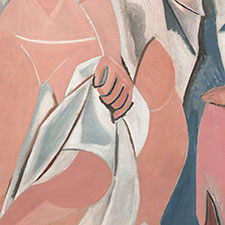
White areas are painted in lead white
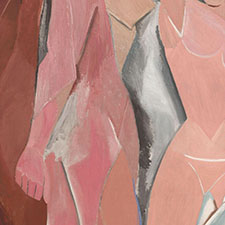
Red: vermilion mixed with lead white
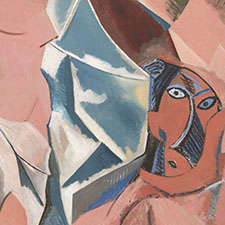
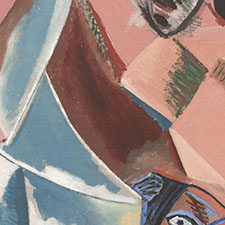
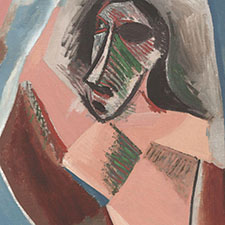
Green areas are painted in emerald green

The small yellow patch contains cadmium yellow
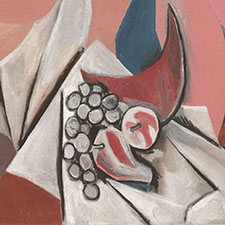
Black lines: bone black
References
(1) Les Demoiselles d’Avignon: Conserving a modern masterpiece, Website of Museum of Modern Art, New York
Pigments Used in This Painting
Resources
Videos
Video: 'Picasso, Les Demoiselles d'Avignon' by Smarthistory
Video: 'Picasso, Les Demoiselles d'Avignon' bySpencer's Painting of the Week
Publications and Websites
Publications
(1) Picasso’s Les Demoiselles d’Avignon, edited by Christopher Green, Courtauld Institute of Art, University of London, Cambridge University Press, 2001.
(2) Rubin, W. et al. Les Demoiselles d’Avignon. The Museum of Modern Art. Studies in Modern Art 3. New York: Museum of Modern Art, 1994.
(3) Bandmann, G. Picasso: Les Demoiselles d’Avignon. Stuttgart: Reclam, 1965.
(4) Golding, J. “The Demoiselles d’Avignon.” The Burlington Magazine, vol. 100, no. 662 (May 1958): 155–163.
(5) Rosenblum, R. “The Demoiselles d’Avignon Revisited.” Art News, no. 72, no. 4 (April 1973): pp. 45-48.
Websites
Les Demoiselles d’Avignon: Conserving a modern masterpiece, Website of Museum of Modern Art, New York.

